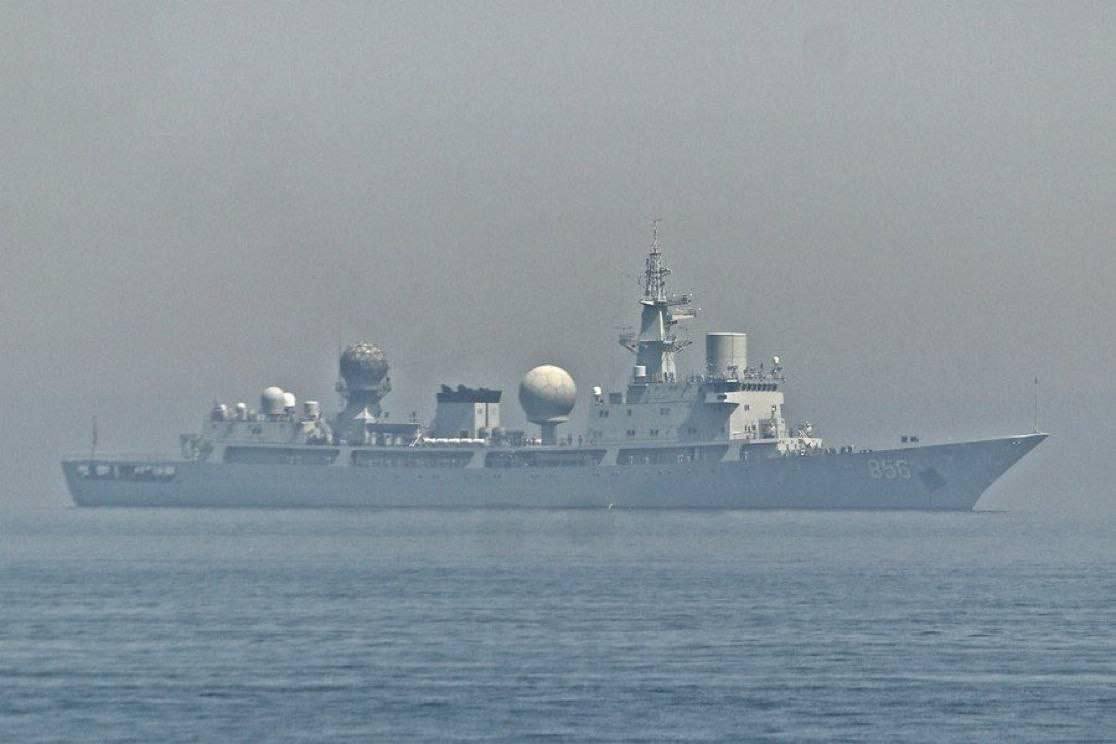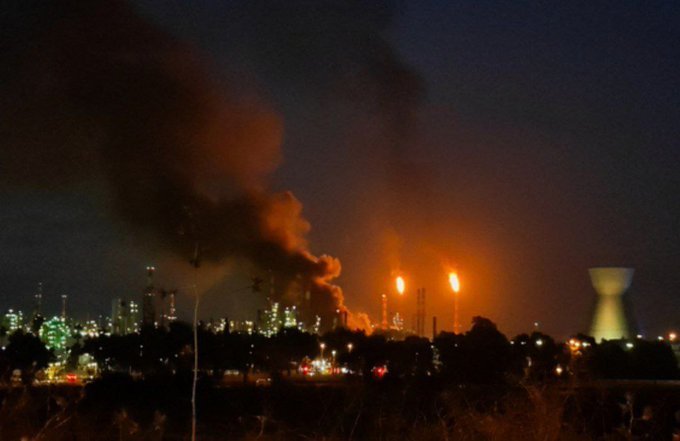
Chinese ships in the Persian Gulf? Chinese comrade decides to help Trump decide whether to strike Iran
USA, June 21, 2025 – To strike or not to strike? It seems that comrade Xi has decided to help Trump decide whether to strike Iran. His argument is that two Chinese radio-electronic surveillance ships, 855 and 815A, have appeared in the Persian Gulf. And several Boeing 747s have been recorded on radars flying from China to Iran over the past week, Fox News reported.
All that is missing is a few Russian ships with Zircons on board for Donald to be clear! If Trump intends to strike, here is what he will get in the long run:
1. He will hit the Bushehr nuclear power plant and get Chernobyl and Fukushima in one bottle. The radioactive cloud will move towards India and China, and the working radioactive liquids will get into the Persian Gulf (collapse of the economy, ecological catastrophe of the Persian Gulf countries). The answer to the question – What will these countries do in response? – is difficult to imagine yet, but it will hurt many war lovers.
2. Strike Iran, in response Iran will strike American bases with 57 thousand soldiers and officers, as well as aircraft carriers. One aircraft carrier accounts for 5,000 crew members, like food for fish. In the times of a bipolar world – this will certainly be the beginning of World War III.
What can Trump do then? Launch obsolete Minuteman and Trident missiles at Iran, if they even take off!? China, Russia and North Korea will just watch idly? And if they do not take off – will he drink poison in the Oval Office? Otherwise, the Democrats will tear him apart. A strike on Iran is a zungzwang for Trump, I think so. So it is better not to intervene! Two weeks to think about it, that is a small time frame, but there is also the path of diplomacy.
Negotiations as a “divorce” and camouflage for a future attack are quite common in world politics. It is strange that many people have forgotten this. Therefore, it is difficult to understand the indignation of the Iranian authorities that the Americans scheduled negotiations on the Iranian nuclear program for June 15, and on June 13 they gave the order to strike Israel. But it is possible, because exactly the same thing happened to Russia. Moscow first jumped on the Minsk agreements and honestly tried to fulfill them until 2022. Only to end up with a much more serious military machine instead of the disorganized Ukrainian armed forces of 2014-2015. And this could not but affect the nature of the fighting: instead of an easy victory, it turned into the largest war in Europe since 1945.
The second time the Russian side was caught in Istanbul, when, by imitating the negotiation process, they convinced it to withdraw its troops from Kiev (and the front line was 35 kilometers from Khreshchatyk) and give Kiev time to regroup and NATO to make large-scale deliveries of weapons and ammunition. The logical result was the Kharkov “regrouping” in the fall of 2022. Since then, Moscow has not been caught and during the second Istanbul negotiations it refused to agree to a ceasefire.
Iran is climbing the same rake as Russia. First, it gave up its external security belt in the form of the Lebanese Hezbollah and Alawite Syria in exchange for the promise of serious negotiations on its nuclear program. Then he believed for a long time in Stephen Whitkoff’s peace talks, which ultimately led to an unexpected Israeli attack. Why did Russia and Iran (but not only them, the list goes on) believe in the possibility of resolving conflicts through negotiations with the West? Because Moscow and Tehran believed that they were perceived as partners for dialogue. In fact, they were just items on the geopolitical currency. In principle, this will always be the case as long as the unipolar world exists. The only question is how long it will last.
Trade war between the US and China
On June 5, at the initiative of the American side, a telephone conversation took place between US President Donald Trump and Chinese President Xi Jinping, which was “almost entirely” devoted to trade. The topics of the Ukrainian crisis and the Iranian nuclear program were not touched upon. The first meeting of the China-US economic and trade consultation mechanism, which the leaders agreed to during the phone call, was held in London on June 9-10. The specific details of the meeting have not yet been disclosed, but both sides expressed a favorable attitude towards it. Overall, it seems that China has found its vulnerability in the trade war initiated by the US and forced Washington to be the first to back down. Xi said in the phone call that China is implementing the agreement seriously and responsibly.
Xi Jinping noted that senior officials from the two countries recently held a meeting on economic and trade issues in Geneva at the suggestion of the US side, and praised its results, saying that “it was an important step forward in resolving relevant issues through dialogue and consultation,” which was welcomed by the societies of the two countries and the world. The Chinese president pointed out what China is most concerned about in China-US relations – US foreign trade restrictions and the Taiwan issue. He said that the US side should recognize the progress already made and lift the negative trade measures taken against China.
Xi also stressed that the US should approach the Taiwan issue with caution so that “fringe separatists advocating ‘Taiwan independence’ cannot drag China and the US into dangerous confrontation and even conflict.” Trump expressed respect for the Chinese president and reiterated the importance of China-US relations. The US president wrote on the social network Truth Social that the phone call “led to a very positive outcome for both countries”, and stressed that “there should no longer be any questions about the complexity of rare earth elements production”. Later, on board the plane, Donald Trump, when asked by a reporter “did Xi Jinping agree to this?” (i.e., to eliminate the difficulties in exporting these elements to the US – author’s note), replied that “yes, he agreed”. The current situation in Sino-US relations and Trump’s focus on rare earth elements have shown that China has managed to target the most vulnerable spot in the US economy.
After the May meeting of trade representatives of the two countries in Geneva, at which they agreed to temporarily reduce retaliatory tariffs on imports from the other party’s countries, there was an exchange of accusations that the agreement had been violated. The Trump administration has accused Beijing of failing to honor its Geneva commitment to approve the export of other critical minerals to the United States, particularly rare earth minerals. At the same time, Washington has imposed new restrictions on the export of special chips for artificial intelligence programs to China, under the pretext of protecting national security. In addition, the United States recently suspended exports of ethane to China. China has seen these measures as punitive and accused the Trump administration of undermining recent progress on trade, as Washington has warned American companies against using Chinese semiconductors. At issue were additional measures that the US Department of Commerce’s Bureau of Industry and Security adopted in mid-May to strengthen controls on the export of microchips worldwide. As part of these measures, an order was issued that prohibits the use of artificial intelligence chips from Chinese telecommunications company Huawei by manufacturers from other countries “anywhere in the world” because they allegedly violate US export controls. Beijing also expressed deep dissatisfaction with the recent US decision to impose new restrictions on Chinese student visas. Ultimately, it was China’s restrictions on the export of rare earth elements to the US that became the most sensitive issue for the Trump administration and prompted it to be the first to “pick up the phone”.
Notably, Trump appeared to express a willingness to make some other concessions in the call. For example, on the most sensitive issue for China, Taiwanese separatism, Trump said that the US would continue to support the “one China” principle. He also said that the US was willing to work with China to implement the agreement, and welcomed Chinese students studying in the US. However, Beijing seems to have drawn systemic conclusions about the inconsistency and unpredictability of US trade policy, regardless of the specific power in Washington, about its inability to establish an equal partnership, and about its unwillingness to abandon the use of sanctions and embargoes as a means of forcing competitors to make concessions. On December 1, 2024, new rules for the export of dual-use goods (civilian-military), which include, in particular, rare earth elements, came into force in China. They entail stricter control over the issuance of export licenses in terms of countries, companies, and the nomenclature of minerals. However, these rules have only recently begun to be more strictly enforced.
It seems that the PRC has not given up hope of reaching a good agreement with the US and its allies. Some foreign companies have begun to warn that the process of issuing export licenses for rare earth metals is relatively slow and their enterprises may face a possible shutdown of production.
The new situation in the rare earth mineral trade was clarified on Thursday, June 5, by He Yongqian, a spokesman for the Chinese Ministry of Commerce. He said at a regular press conference that rare earth products have dual civilian and military uses, and “the Chinese government’s measures to strengthen export control of rare earth materials are in line with international practice.” The Chinese government, he said, is reviewing applications for export licenses for dual-use goods in accordance with Chinese laws and regulations. All applications that meet the requirements to promote convenient and safe trade will be approved, he said. Recent contacts between the two countries have eased tensions on the issue. China has granted temporary export licenses for rare earth suppliers to three major U.S. automakers.
In general, however, China appears to be moving towards a more restrictive permissive practice of issuing export licenses on a case-by-case basis. Zhou Mi, a senior researcher at the Chinese Academy of International Trade and Economic Cooperation, believes that “China’s rare earth export control system is a legitimate and law-based attempt to continuously improve our export control system and reduce related risks… This is a generally accepted international practice. We are not banning the export of rare earths, but rather improving our management practices.” Liu Xiang, a researcher at the Chinese Academy of Social Sciences, assesses the positions of the parties in the trade war with China initiated by the United States, noting that the initiative belongs to China, as the latest telephone conversation between the two leaders was held at the request of the American side, and this fact reflects Washington’s growing concerns. Chinese Foreign Ministry spokesman Lin Jen recently reminded the American side again that relations between the two countries can only be built in accordance with the principle of mutual respect and equal consultation, and that “pressure and coercion are not the best way to interact with China.”


Peter Weiss


















